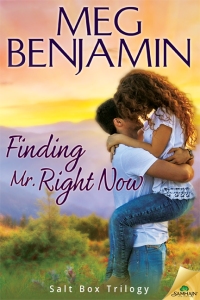 As a writer, I find waiting for release day tough. I want to talk about my book, shout about my book, gloat about my book. But until release day, I won’t know if other people enjoy my book as much as I enjoyed writing it. But now the wait is over, at least as far as Finding Mr. Right Now is concerned. My book is finally available at all the usual places, including Amazon, Barnes and Noble, Samhain Publishing, and All Romance eBooks.
As a writer, I find waiting for release day tough. I want to talk about my book, shout about my book, gloat about my book. But until release day, I won’t know if other people enjoy my book as much as I enjoyed writing it. But now the wait is over, at least as far as Finding Mr. Right Now is concerned. My book is finally available at all the usual places, including Amazon, Barnes and Noble, Samhain Publishing, and All Romance eBooks.
So let me give you a quick taste of my book. First of all, here’s the blurb:
Reality can be hotter than fiction.
The Salt Box Trilogy, Book 1
Monica McKellar, associate producer of Finding Mr. Right, is desperate. One of the show’s bachelors has bailed one week before shooting starts. She not only needs a replacement ASAP, he has to get the temperamental bachelorette’s stamp of approval.
Fortunately there’s a hot guy right under her nose who’s a perfect fit. Unfortunately, he pushes all her hot buttons. Until the show’s over, her hands—and every other part of her body—are tied.
When Paul DeWitt signed on to write for the reality show, “Bachelor #10” wasn’t supposed to be in his job description. He fully expects to be cut early on, which will free him to focus on the real object of his attraction. Monica.
Instead, he’s a finalist, and they’re all packed in an SUV climbing the Continental Divide, headed for Salt Box, Colorado. Where stampeding horses, vindictive tabloid editors, and one capricious bachelorette’s waffling over suitors may conspire to end Paul and Monica’s romance before it even starts.
Warning: Contains hot sex on the sly, cold nights, creaking wicker couches, and a gypsy wagon that gives a whole new appreciation for the pioneers.
And here’s a quick excerpt. The production team at Fairstein Productions is in a tizzy–one of the bachelors for their Finding Mr. Right show has gone AWOL. They need someone new immediately if not sooner, and their choice turns out to be one of the show’s writers, Paul Dewitt. In this scene Paul learns his fate from the reluctant assistant producer, Monica McKellar.
Paul followed the two of them into Glenn Donovan’s office. He sank into a metal and leatherette chair at the side. “What’s going on?”
McKellar pushed her hair out of her face again. Butterscotch. Her hair was the color of butterscotch. It made her skin look like cream, very lickable. Lickable? Jesus.
She took a breath. “Okay, I told you we were missing a bachelor, right? One of them took off for Ohio yesterday.”
Paul nodded. “Right. But you said you were going to find somebody else.”
“Yes.” McKellar grimaced. “Well, Ronnie had an idea. And apparently Artie thinks it’s a good idea.”
Sid narrowed his eyes. “Artie likes something Ronnie came up with? That’s like one of the signs of the Apocalypse.”
“Be that as it may.” McKellar sounded like she was gritting her teeth. “They both think Paul here would be a good substitute for Bachelor Number Ten.”
Paul stared at her blankly. “Me? One of the bachelors? But I’m supposed to write the damn thing.”
“Right, well, we’d be down a writer for this show. They’d have to transfer somebody over from Finding Miss Right or one of the other shows. But look at the bright side—it would give you some really good insights into what the bachelors and bachelorettes go through when they’re doing the challenges. It might help you with the writing.” She gave him a very bright smile that didn’t go any further than her lips.
His stomach felt as if he’d swallowed a dozen ice cubes. “And if I say no?”
McKellar pushed her hair back again. “Look, I don’t know what would happen if you didn’t take the gig, but knowing Artie it wouldn’t be good.”
Sid nodded. “If you don’t do it, I think you could probably kiss off your chances of getting another contract with Fairstein. But look at it this way—if you do go through with it, Artie will owe you, big time. That could be a good thing.”
Paul tried to pull his tumbling thoughts back into some kind of order. “But the thing is, I don’t even like Ronnie Valero.”
One of McKellar’s butterscotch eyebrows arched up. “You don’t think the other bachelors are interested in a real, long-term relationship, do you? I mean, you’ve been with Finding Miss Right for a while.”
His jaw tightened. “No, of course not. But—”
“The bachelors and bachelorettes are all in it for something other than a great romance. A lot of them want the screen time. Some of them want the money. Some just want a paid vacation. You’d be in it to keep your job. It’s not that different—maybe even a little more honest. Everybody in the production crew would be on your side.” Those pink lips edged up into another faint smile.
Paul’s stomach twisted again. “But I…”
McKellar gave a little huff of exasperation. “Look, let’s be blunt here. You’d be Meat. That’s all. One of those people who fill out the list. After a couple of weeks, you’d probably be gone, particularly if you didn’t want to stick around. If you don’t come across as interested, Ronnie will probably reject you. Then you could go back to working on Finding Miss Right. No harm, no foul.”
Paul’s chest clenched tight. Meat. Well, at least she was up front about it, which was more than they probably were with the other guys. Still, the thought gave his ego a solid kick. “I see.”
“Right.” Sid nodded encouragingly. “Probably wouldn’t take more than a month of your time, tops. And you could get a trip to Colorado out of it, assuming you get through the L.A. challenges.”
Colorado. Paul’s gut twisted again. His folks would find out. His hyper-romantic mother would probably see the show and start planning for a wedding. Hell. “Seems like I don’t have much of a choice here.”
McKellar leaned back against the side of the desk, extending one shapely leg. “It won’t be that bad. And like Sid said, Artie will owe you. He’s pretty good about paying his debts too. You’d probably have a chance for a long-term commitment from the production company.”
Paul considered his possible options, all of them lousy. He rubbed his eyes, then sighed. “Okay. I’ll do it.”
“Bachelor Number Ten.” Sid gave him a relieved grin. “Welcome aboard.”
Finding Mr. Right Now is now available. Enjoy!




